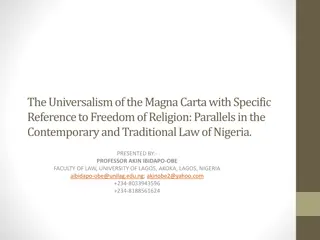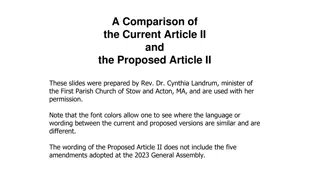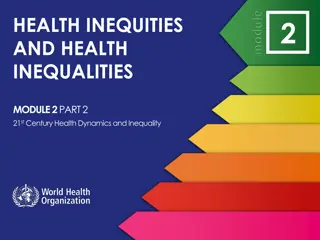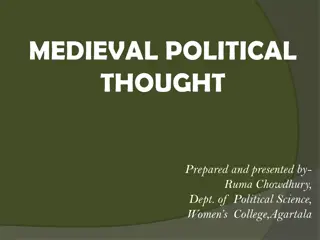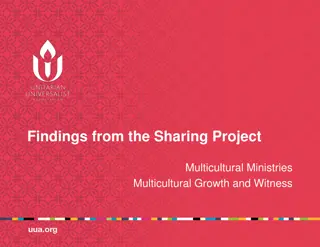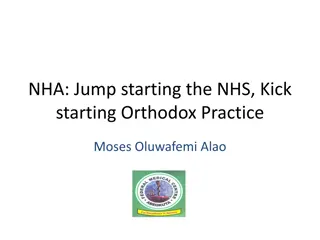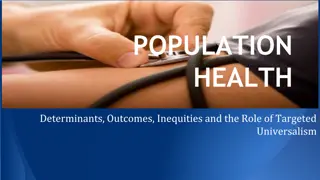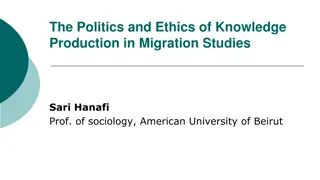Exploring Nationalism, Universalism, and Secularism in Education: Insights from Tagore and Krishnamurty
Delve into the profound concepts of nationalism, universalism, and secularism in education as elucidated by Dr. V. Regina, Principal at CSI Bishop Newbigin College of Education. The content explores the meanings, philosophies, and celebrations associated with these ideologies, drawing perspectives f
0 views • 22 slides
The Universalism of Magna Carta: Freedom of Religion in Contemporary Nigerian Law
Magna Carta, a pivotal human rights document, is explored with a focus on its religious underpinnings and its influence on modern legal systems. The parallels and divergences between Magna Carta and Nigerian customary law regarding freedom of religion are examined. The implications of contemporary N
0 views • 16 slides
A Comparative Analysis of Current and Proposed Article II
Comparison of the current and proposed Article II, prepared by Rev. Dr. Cynthia Landrum, focusing on the differences and similarities in wording. The proposed Article II excludes amendments adopted in the 2023 General Assembly. Additionally, it contrasts the sources of inspiration, values, and coven
1 views • 31 slides
Understanding Health Inequities and Inequalities in the 21st Century
Explore the differences between health inequality and inequity, and how societal disparities impact health outcomes. Delve into the concept of health equity defined by the World Health Organization and the role of social determinants in creating avoidable health inequities. Learn about the social gr
0 views • 23 slides
Critique of Universal and Differentiated Citizenship
Universal citizenship embodies equality of rights for all citizens, while differentiated citizenship focuses on special representation rights for oppressed groups. Iris Marion Young criticizes the universalism in citizenship, advocating for differentiated citizenship to address the needs of marginal
2 views • 10 slides
Medieval Political Thought: Key Thinkers and Concepts
Explore the medieval political thought highlighting prominent thinkers like St. Augustine, St. Thomas Aquinas, and Marsilius of Padua. The period was characterized by universalism, the absence of organized states, and a blend of politics, economics, and religion. Discover the parallelism between Pla
3 views • 6 slides
Insights from Multicultural Ministry Growth Survey
Findings from the Sharing Project Multicultural Ministries reveal data and insights gathered from Unitarian Universalists historically marginalized by different factors, aiming to understand their unique experiences, needs, and challenges within Unitarian Universalism. The survey collected 1,500 res
1 views • 21 slides
Reflections on Ethical Practices in Healthcare
Delve into thought-provoking reflections on ethical practices in healthcare, exploring the intersection of medicine, philosophy, and morality. Explore the importance of intention versus outcomes, the role of universalism and relativism in moral decision-making, and the concept of developing a goodwi
0 views • 27 slides
Understanding Population Health: Determinants, Inequities, and Outcomes
Explore the intricate web of determinants influencing population health, including natural and social factors. Learn how targeted universalism can address health inequities and promote better health outcomes for all. Discover the key themes and importance of population health at all levels, along wi
0 views • 18 slides
Understanding Corruption, Governance, and Societal Norms
Alina Mungiu-Pippidi delves into the complexities of corruption, governance regimes, and societal norms, emphasizing the need to transform governance systems rather than just combat illegal corruption. She explores the concepts of corruption at the individual and societal levels, governance regimes,
0 views • 30 slides
The Politics and Ethics of Knowledge Production in Migration Studies by Sari Hanafi
This insightful study delves into the politics and ethics surrounding knowledge production in migration studies. It explores the normativity of migration studies, identity politics, and universalism, while emphasizing the importance of ethics and epistemic community. The discourse also touches upon
0 views • 16 slides

